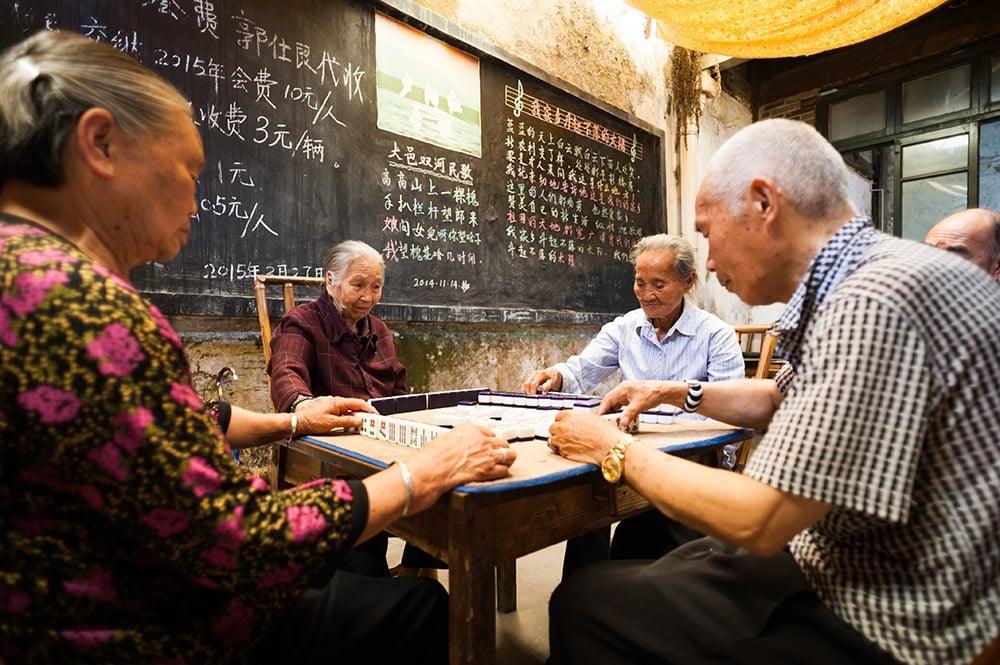As China gets older, the country faces huge challenges but what could a booming senior services sector mean for British business? asks Amy Snelling
Forecasts about China’s rapidly greying population paint an ailing picture of the country nicknamed the ‘World’s Factory’ largely for its seemingly infinite manufacturing workforce that both it and global markets have come to depend on. At the end of 2018, the National Bureau of Statistics put China’s population of over 65-year-olds at 11.9 percent of the total population. Fast-forward to 2050, and it’s predicted that 487 million Chinese citizens (one-third of the population) will be over 60, as reported in Xinhua.
Additionally, a report from the Chinese Academy of Social Sciences states that come 2030, while China’s elderly population expands, the overall population is set to start shrinking after peaking at 1.44 billion. Decreasing birth rates plus an increasing life expectancy will combine to put additional pressure on a declining workforce facing the need to support a booming number of senior citizens.
While China isn’t alone in its ageing, joining the ranks of numerous greying nations, it is still unique. The World Health Organisation (WHO) reports that China is getting older at an increased rate compared to other low- and middle-income countries. Professor and Director of the University of Glasgow Scottish Centre for China Research Jane Duckett explains, “the ageing of populations is something that happens in most societies as they develop.” However, in China’s case, alongside the usual factors such as increased wealth, “it’s been accelerated by imposing a one-child policy, rather than allowing a more natural transition to smaller families…”
China’s controversial one-child policy was introduced in 1979 and despite efforts in recent years to encourage families to have more children, including the 2016 relaxation which saw the introduction of a two-child policy, The National Bureau of Statistics reports that in 2018 the birth rate fell to 15.23 million, a reduction of 2 million newborns compared to 2017.
Given the rapid rate of ageing, key sectors are not yet prepared for the elderly influx. “It’s something that all societies with ageing populations are grappling with, but because China’s ageing is accelerated, and it’s happening at a slightly lower level of wealth in terms of GDP per capita for the country, it does put particular strains on the system,” Duckett continues.
China’s shift from a manufacturing-led to an increasingly service-based economy may help to ease the burden of its greying population by reducing the need for manual labourers in their prime. At the same time, the opening-up of the services sector could provide opportunities for British businesses to surf China’s “silver wave.”
While China’s ageing population poses huge opportunities for its pension asset managers, there are admittedly some challenges to work through first
With age-related illnesses inevitably on the rise, one area where China has been encouraging foreign investment is elderly care. According to statistics from China’s National Working Committee on Ageing, cited in Caixin Global, elderly care is expected to account for 25 percent of the country’s GDP by 2050 – an 18 percent increase from where it stood in 2018. Looking at dementia alone, the World Health Organisation warns it’s a disease that is expected to pose huge challenges for China’s health care system. The South China Morning Post reports that Alzheimer’s patients are predicted to hit 45 million in China by 2050, equating to roughly half the global number.
Care Visions is one British company already navigating the market, offering non-pharmaceutical dementia care services in China since 2014. Director of Operations, Vicky Zhang explains that when Care Visions first entered the market, there was “little knowledge and understanding about dementia care and [the] non-drug, therapeutic approach.” But, over the past few years, “the Government has increased awareness of dementia amongst the general public.”
However, while knowledge is on the rise, the challenges of entering the market are still very real. Despite the “huge potential,” Zhang believes the spending habits aren’t there yet. “The demand of dementia care is going to increase, especially in the next ten to 20 years… But we think China isn’t ready yet… People have the money, but they choose not to spend it on senior care services. But in the next ten years, when [parents of the] one-child generation come to the age that they need care, there will be a huge demand for senior care facilities.”

By 2050, it is predicted that 487 million Chinese citizens will be over 60
Another pressure point? Pensions. Duckett highlights the “retirement age is still low in China on international comparison,” ranging from around 50 to 60 depending on the sector. Of course, the longer people live and the smaller the working population, the larger the strain that puts on the system. “China’s going to have to rethink pensions and its financial support for elderly people as the balance shifts between the working and elderly populations.”
Whether there’s opportunities for foreign pension asset managers to move in is a question worth asking. David Guo, Head of China Business at global asset managers Schroders says, “While China’s ageing population poses huge opportunities for its pension asset managers, there are admittedly some challenges to work through first.” For example, like many major economies, in China “the funding gap between the nominally promised benefits and the accumulated pension assets is increasing every day.” Furthermore, “getting a pension asset management license is not currently allowed for overseas asset managers, unless potentially working with a Chinese partner who can access the market.”
Despite challenges, Guo notes that with the right local partners, “the opportunities are tremendous given the size of the pension asset pool, the need to enhance pension investment returns, as well as the expertise this calls for”. So what does that mean for now? Well, for Schroders, Guo notes that “the most immediate opportunity… is expected to be the third pillar market where we are exploring innovative approaches with our joint venture, BOCOM Schroders, to provide pension solutions to Chinese individuals. In addition, there could be opportunities to establish strategic partnerships with Chinese pension asset managers.” And beyond that? “Schroders will continue to contribute to the development of the local pension market through knowledge sharing and research cooperation with the authorities and industry stakeholders.”
The takeaway? While there’s ample opportunity for foreign investment in China’s growing senior market, there’s still a way to go. Right now, it’s time to watch this space and prepare for the silver wave.


